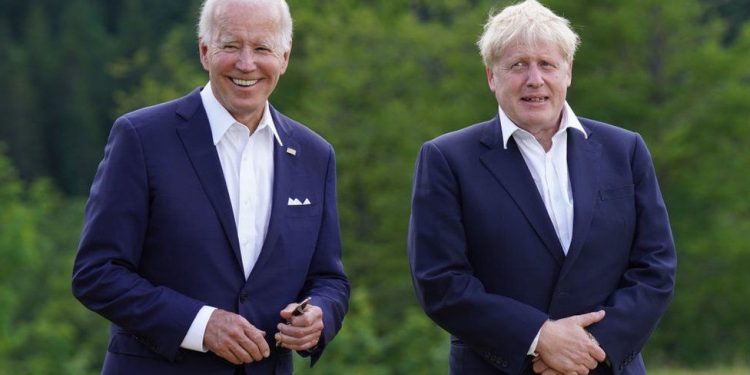G7 leaders have detailed plans to mobilise $600bn in funding for the developing world in a move seen as a counter to China’s Belt and Road plan.
The Partnership for Global Infrastructure and Investment (PGII) relaunches a scheme unveiled at last year’s G7 talks in England.
US President Joe Biden said the plan would deliver returns for everyone.
China’s multi-trillion dollar infrastructure initiative is criticized for hitting nations with too much debt.
“I want to be clear. This isn’t aid or charity,” Mr Biden said of the G7’s PGII scheme. “It’s an investment that will deliver returns for everyone.”
The scheme would allow countries to “see the concrete benefits of partnering with democracies,” the US president added.
The plan calls on G7 leaders to raise $600bn over five years to fund the launch of infrastructure projects in middle and low-income countries.
The US has promised to raise $200bn (£162bn) of the total through grants, federal funds and private investment, while the EU has announced a further 300bn euros (£257bn).
The initiative will be geared towards tackling climate change, improving global health, achieving gender equity and building digital infrastructure.
Some of the highlighted initiatives include a solar-powered project in Angola, a vaccine manufacturing facility in Senegal, and a 1,609 km submarine telecommunications cable connecting Singapore to France via Egypt and the Horn of Africa.
The plan has been pitched as a way to counter China’s ambitious Belt and Road Initiative (BRI). Launched by Chinese President Xi Jinping in 2013, the BRI provides financing for emerging countries to build infrastructures like ports, roads and bridges.
While it has developed trade links, it has also been criticised as a means of providing “predatory loans”, forcing debt-saddled countries to cede key assets if they fail to meet their debt repayments.
European Commission President Ursula von der Leyen said the aim of the latest project was to present a “positive, powerful investment impulse to the world to show our partners in the developing world that they have a choice”.
The infrastructure plan was first unveiled at the 2021 G7 summit in Britain. Called the Build Back Better World at the time, the US-driven plan faltered from a lack of progress, and the project was renamed to PGII before being resuscitated at the 2022 summit.
Latest Stories
-
GBC accuses Deputy Information Minister Sylvester Tetteh of demolishing its bungalow illegally
11 mins -
Boost for education as government commissions 80 projects
22 mins -
NAPO commissions library to honour Atta-Mills’ memory
33 mins -
OmniBSIC Bank champions health and wellness with thriving community walk
35 mins -
Kora Wearables unveils Neo: The Ultimate Smartwatch for Ghana’s tech-savvy and health-conscious users
39 mins -
NDC supports Dampare’s ‘no guns at polling stations’ directive
42 mins -
Police officer interdicted after video of assault goes viral
59 mins -
KNUST’s Prof. Reginald Annan named first African recipient of World Cancer Research Fund
60 mins -
George Twum-Barimah-Adu pledges inclusive cabinet with Minority and Majority leaders
2 hours -
Labourer jailed 5 years for inflicting cutlass wounds on businessman
2 hours -
Parliament urged to fast-track passage of Road Traffic Amendment Bill
2 hours -
Mr Daniel Kofi Asante aka Electrician
2 hours -
Minerals Commission, Solidaridad unveils forum to tackle child labour in mining sector
2 hours -
Election 2024: Engagement with security services productive – NDC
2 hours -
Retain NPP for the good of Ghana – Rebecca Akufo-Addo
2 hours

